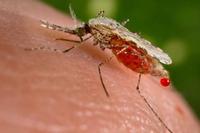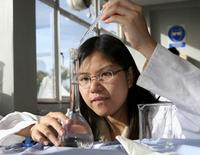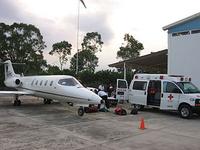-
Pennsylvania emergency professionals receive WMD training
The Center for Domestic Preparedness (CDP) in Alabama hosted more than a hundred emergency professionals from the Pennsylvania South Central Mountains Regional Task Force’s Health and Medical Committee for in-depth response-to-WMD training.
-
-
Rendering mosquitoes immune to malaria parasites

Scientists have established an inheritable bacterial infection in malaria-transmitting Anopheles mosquitoes that renders them immune to malaria parasites. The strategy holds promise for malaria control efforts.
-
-
Illnesses in U.S. on the rise as a result of decline in foreign food inspections
More Americans get sick every year as a result of food-borne pathogens. The reason: inspections at foreign food factories shipping food and food ingredients to the United States have declined in recent years, and border inspections of food coming into the country could be next to be reduced. Experts say this decline in inspections is especially worrisome since Americans consume more imported food – or food made with imported ingredients – every year, and foreign food production and processing facilities often do not meet U.S. sanitation and hygiene standards.
-
-
Silica particles purify water by acting as oil magnets
Engineers develop an innovative method designed to purify water through the rapid removal of oily pollutants. The technology involves the deployment of surface engineered silica particles, which act as oil magnets in water, adsorbing oil, yet repelling water.
-
-
Ebola's secret weapon revealed: its ability to short-circuit the immune system
Researchers have discovered the mechanism behind one of the Ebola virus’ most dangerous attributes: its ability to disarm the adaptive immune system. Scientists determined that Ebola short-circuits the immune system using proteins that work together to shut down cellular signaling related to interferon. Disruption of this activity, the researchers found, allows Ebola to prevent the full development of dendritic cells that would otherwise trigger an immune response to the virus.
-
-
Schools do not offer students sufficient practical science experience

New evidence shows that a worrying number of students are not experiencing a complete and authentic education in the sciences, due to a lack of resources for practical work. Secondary schools reported not having enough of some of the most commonly used equipment, such as microscopes, eye protection, and connecting leads for circuits. The research also shows that many secondary schools lack essential support from qualified technicians to carry out practical work.
-
-
Horse meat in the human diet
Horse long has been on menus in continental Europe, sold from shops that often advertise with a carved horse head on the store front.A chemist explains the testing for horse DNA in food products, and discusses the concerns about selling and eating horse meat in the United States.
-
-
New fertilizer can be used to grow food – but not build bombs

Ammonium nitrate fertilizer is used in agriculture, but when mixed with a fuel such as diesel, it is highly explosive. It was used in about 65 percent of the 16,300 homemade IEDs in Afghanistan in 2012.About 1,900 troops were killed or wounded in IED attacks in 2012, 60 percent of American combat casualties. There have been more than 17,000 global IED incidents in 123 countries in the past two years. Timothy McVeigh used ammonium nitrate in Oklahoma City in 1995. Scientists have developed a fertilizer that helps plants grow but cannot detonate a bomb.
-
-
Volatility of food prices is still a mystery
Riots, political instability, and a spike in malnourishment cases blighted the years 2007 and 2008, particularly in developing countries. The cause was a sudden surge in global food prices, with rice eventually rising several hundred per cent as importing countries simply could not get enough of this basic foodstuff.Food market volatility has yet to be understood, and there is no definite proof that it is due to speculators.
-
-
Office implementing Obamacare avoids furloughs
Gary Cohen, the director of the Center for Consumer Information and Insurance Oversight, said Wednesday that his office will not be furloughing its workers due to the federal budget cuts known as the sequester. His office is in charge of implementing most of President Obama’s healthcare law.
-
-
Preventing bugs from becoming antibiotic-resistant
About 440 000 new cases of drug-resistant tuberculosis emerge annually, causing around 150 000 deaths. New research finds that bacteria can evolve resistance more quickly when stronger antibiotics are used. The rate of evolution of antibiotic resistance speeds up when potent treatments are given because resistant bacterial cells flourish most during the most aggressive therapies.
-
-
Fighting superbugs with a new genre of antibodies
In an advance toward coping with bacteria that shrug off existing antibiotics and sterilization methods, scientists are reporting development of a new family of selective antimicrobial agents that do not rely on traditional antibiotics.
-
-
U.S. hospitals shipping sick immigrants back to their home countries

Hundreds of immigrants who are in the United States illegally end up in the hospital only to find out they will be sent home through a removal system run by hospitals trying to avoid the high cost of treating illegal immigrants.
-
-
New detection test to improve food safety, bioterrorism defense
Sales of chicken products in China plummeted recently during an outbreak of a deadly new strain of bird flu. From bird flu to mad cow disease, numerous food scares have made global headlines in recent years.Scientists develop new detection technique which wouldmake food contamination testing more rapid and accurate. The detection test could also accelerate warnings after bioterrorism attacks.
-
-
Interior Dept. releases progress report on U.S. Water Census
The U.S. Interior Department issued released a report to Congress on the progress of the National Water Census. As competition for water grows — for irrigation of crops, for use by cities and communities, for energy production, and for the environment — the need for the National Water Census and related information and tools to aid water resource managers also grows. The Water Census will assist water and resource managers in understanding and quantifying water supply and demand, and will support more sustainable management of water resources.
-
More headlines
The long view
We Ran the C.D.C.: Kennedy Is Endangering Every American’s Health
Nine former leaders of the Centers for Disease Control and Prevention (CDC), who served as directors or acting directors under Republican and Democratic administrations, serving under presidents from Jimmy Carter to Donald Trrump, argue that HHS Secretary Roert F. Kennedy Jr. poses a clear and present danger to the health of Americans. He has placed anti-vaxxers and conspiracy theorists at top HHS positions, and he appears to be guided by a hostility to science and a belief in bizarre, unscientific approaches to public health.
